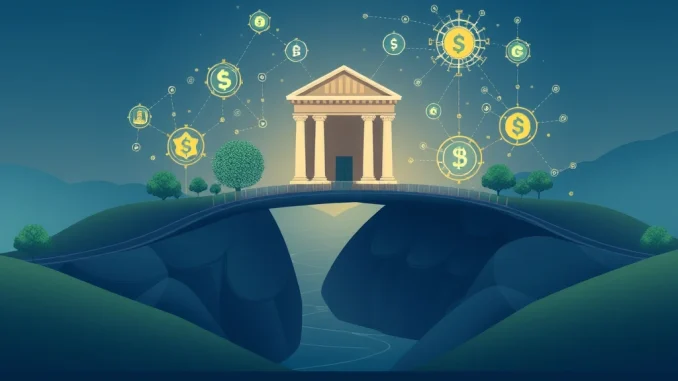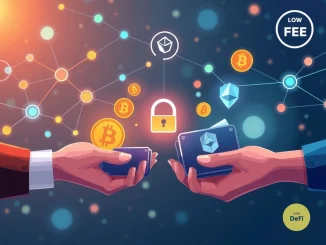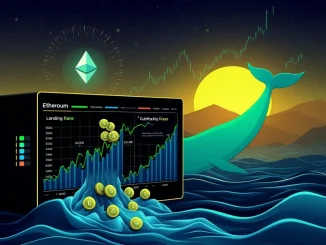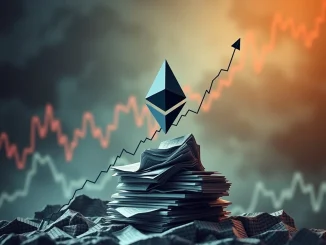
A significant development has occurred at the intersection of traditional finance and decentralized finance (DeFi). **Chainlink**, a leading decentralized oracle network, played a crucial role in a groundbreaking test alongside **JPMorgan**’s Onyx division (specifically, Kinexys) and **Ondo Finance**.
What Happened with Chainlink, JPMorgan, and Ondo Finance?
The core of this news involves the successful completion of a crosschain delivery versus payment (DvP) settlement. This wasn’t just any test; it demonstrated interoperability between distinct blockchain environments:
- A permissioned network (representing traditional finance infrastructure, likely within JPMorgan’s Kinexys platform).
- A public testnet (specifically, the Ondo Chain testnet).
This test, as reported by Cointelegraph, marks a tangible step towards bridging the gap between closed, institutional systems and open, decentralized ones.
Understanding Crosschain Settlement and DvP
Let’s break down the key terms:
- **Delivery versus Payment (DvP):** This is a standard settlement method in financial markets where the transfer of securities (delivery) occurs simultaneously with the transfer of cash (payment). This eliminates settlement risk, ensuring that neither party delivers an asset without receiving the corresponding payment, and vice versa.
- **Crosschain Settlement:** This refers to the process of settling transactions involving assets or payments that reside on different blockchain networks. Traditionally, settling assets across separate blockchains is complex and requires intermediaries or involves significant risk.
Combining these, crosschain DvP means simultaneously exchanging an asset on one blockchain for a payment on a different blockchain securely and efficiently.
How Did Chainlink Enable This Breakthrough?
The success of this crosschain DvP settlement hinged on interoperability technology. The test utilized Chainlink’s **Cross-Chain Interoperability Protocol (CCIP)**, specifically leveraging components like the **Chainlink Runtime Environment**. CCIP is designed to allow different blockchain networks to communicate and transfer data or tokens securely and reliably.
In this scenario, CCIP likely facilitated the necessary communication and coordination between the permissioned **JPMorgan** network and the public **Ondo Finance** testnet to ensure the atomic (simultaneous) exchange of assets and payments required for DvP.
The Roles of the Participants: JPMorgan, Ondo Finance, and Chainlink
Each entity brought a key component to the table:
- **JPMorgan (Kinexys/Onyx):** Representing the traditional finance side and the permissioned network environment. JPMorgan has been actively exploring blockchain technology for various applications, including digital asset settlement, through its Onyx division. Kinexys is their tokenized collateral network.
- **Ondo Finance:** A prominent player in bringing traditional finance assets (like U.S. Treasuries and money market funds) onto the blockchain. Ondo Finance provided the public testnet environment (Ondo Chain testnet) and likely the tokenized asset or payment leg on that side of the transaction.
- **Chainlink:** Provided the critical interoperability layer. Chainlink’s CCIP acted as the secure bridge, enabling the disparate networks operated by JPMorgan and Ondo Finance to interact and execute the complex DvP logic atomically.
Why Is This Crosschain Settlement Significant?
This successful test highlights several important trends and possibilities:
- **TradFi and DeFi Convergence:** It demonstrates the technical feasibility of traditional financial institutions interacting directly with public blockchain infrastructure in a secure and compliant manner.
- **Increased Capital Efficiency:** Enabling DvP across networks can unlock liquidity and reduce settlement times and costs compared to traditional methods or complex cross-chain bridging solutions.
- **Reduced Counterparty Risk:** The atomic nature of DvP settlement minimizes the risk of one party failing to deliver after the other has completed their part.
- **Validation for Interoperability Protocols:** It serves as a strong use case and validation for technologies like Chainlink’s CCIP in facilitating complex financial operations across different blockchain ecosystems.
- **Future of Financial Markets:** This type of crosschain capability is foundational for building more integrated, efficient, and resilient digital asset markets that can span both institutional and potentially retail participants.
Looking Ahead: What Does This Mean for the Future?
While this was a testnet demonstration, it provides a clear roadmap for how institutions like **JPMorgan** can potentially leverage public blockchain networks and tokenized assets offered by platforms like **Ondo Finance**. The role of interoperability solutions like **Chainlink**’s becomes increasingly vital as the digital asset landscape remains fragmented across multiple chains and institutional platforms.
This collaboration between major players from both the traditional financial world and the crypto space, powered by essential infrastructure like Chainlink, signals a continued movement towards a future where digital assets and blockchain technology are integral to global financial plumbing. Expect more explorations and pilot programs in this space as institutions seek efficient ways to manage and settle tokenized assets across different environments.
Conclusion
The successful crosschain DvP settlement involving **Chainlink**, **JPMorgan**, and **Ondo Finance** is more than just a technical achievement; it’s a powerful indicator of the direction financial markets are heading. By proving that secure, simultaneous asset and payment transfers are possible between permissioned and public networks, they have laid groundwork for potentially revolutionizing how value is exchanged in the digital age. Keep an eye on how these collaborations evolve, as they could shape the future of finance.



